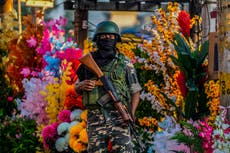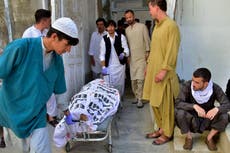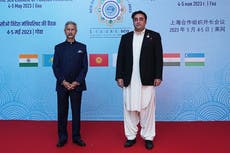Pakistan is ready to talk to India, country’s PM Shehbaz Sharif says: ‘War not an option’
Pakistan PM, however, says Islamabad will hold discussions if Delhi is ready to talk on ‘serious matters’
Pakistan’s prime minister Shehbaz Sharif has once again extended its outreach to India for talks on historical issues despite Delhi’s reluctance to engage and due to it accusing the former country of fomenting cross-border terrorism.
The relationship between the two nuclear powers has remained strained since former British colony India was partitioned on attaining independence in 1947 and Pakistan was created. They have since fought three wars, including two over Kashmir, a region they control in parts, but claim in full.
Mr Sharif, however, said Islamabad would hold discussions if Delhi was ready to talk on “serious matters”.
“We have nothing against anybody. We have to look after our own self. Build our nation,” he said on the sidelines of the inauguration of the Pakistan Minerals Summit in Islamabad.
“Even with our neighbour, we are prepared to talk to them provided that the neighbour is serious to talk [on] serious matters on the table,” he said.
“Because war is no longer an option. Pakistan is a nuclear power, not for aggression but for our defence purposes.”
Without referring to India directly in his speech, he said the country has to understand that ties cannot be normalised “unless abnormalities are removed, unless our serious issues are understood and addressed through peaceful and meaningful discussions”.
Mr Sharif was referring to the issue of Jammu and Kashmir, over which it accuses India of various human rights violations and has raised the issue at the UN several times to demand a resolution.
India has, however, accused Pakistan of waging a proxy war in the Kashmir valley by backing separatist militants in the region and providing safe haven on its soil to terrorists, who it said have carried out deadly attacks, including the deadly 2008 Mumbai terror attacks and a 2019 attack on an Indian army convoy in Pulwama.
Islamabad has denied all allegations.
This was Mr Sharif’s second such outreach effort since he became prime minister last year.
It comes as diplomatic ties between the two countries remain suspended since 2019, following the Narendra Modi government’s decision to revoke the semi-autonomous status provided in Article 370 of the Indian Constitution for Jammu and Kashmir, splitting the former state into two federally controlled territories.
In January, during his visit to UAE, Mr Sharif called for talks with Delhi “on burning issues such as Kashmir”.
“I will give my word that we will talk to India with sincerity, but it takes two to tango,” Mr Sharif had said in an interview with Al Arabiya news channel.
“My message to the Indian leadership and Prime Minister Narendra Modi is that let us sit down on the table and have serious and sincere talks to resolve our burning issues like Kashmir,” he said.
India has categorically rejected the calls, however, citing the issue of cross-border terrorism.
In the latest dismissal to Pakistan, India’s foreign minister S Jaishankar said there would be no “normal relationship with Pakistan” until there takes place a departure from what he said was Pakistan’s policy of cross-border terrorism.
“Pakistan obviously is the exception when it comes to the neighbourhood. The fact is we can’t allow terrorism to be normalised. We can not allow that to become a basis to come into discussion with Pakistan,” Mr Jaishankar said in June.
“And the issue really is that until there is abrogation of this policy of cross-border terrorism, clearly it is not possible to have a normal relationship.”
The foreign ministers of the two countries got involved in a war of words when Pakistani diplomat Bilawal Bhutto Zardari came to India for the first time in over a decade on the sidelines of the Shanghai Cooperation Summit in May.
Mr Jaishankar called Mr Zardari a “promoter” and “spokesperson” for terrorism while the Pakistani leader called Delhi to refrain from “diplomatic point scoring” on the issue of terrorism.
Mr Sharif’s comments come as India’s top court began hearing petitions challenging the constitutionality of 2019 decision to downgrade the region to a union territory from a state and revocation of special status granted to the region after its accession with newly independent India in 1947.
The petitioners have called the move by the Indian government a “betrayal and an assault” on Kashmiri identity.
Join our commenting forum
Join thought-provoking conversations, follow other Independent readers and see their replies
Comments




Bookmark popover
Removed from bookmarks